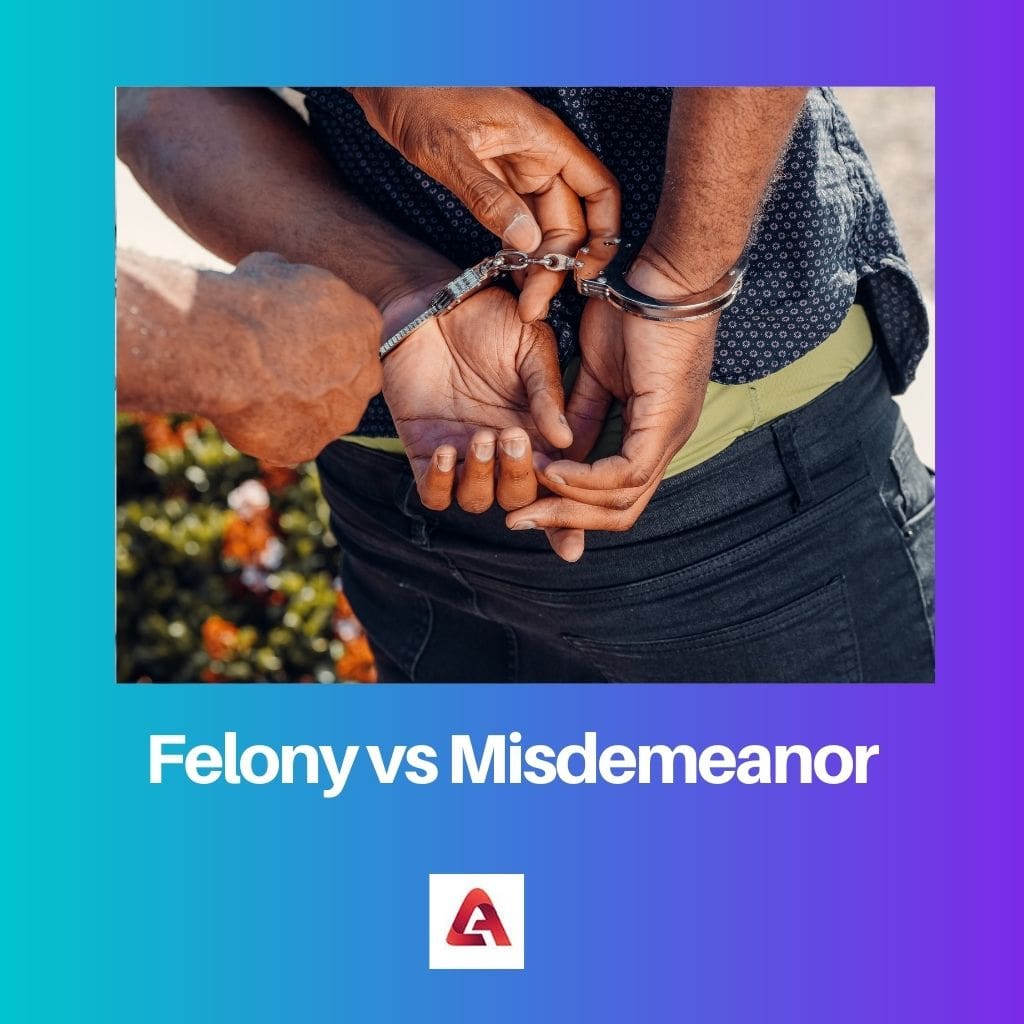A felony is a serious crime typically punishable by imprisonment for more than one year, such as murder or robbery. In contrast, a misdemeanor is a less severe offense usually penalized with fines or incarceration for less than one year, like petty theft or disorderly conduct.
Key Takeaways
- Felonies and misdemeanors are two categories of criminal offenses.
- Felonies are serious crimes punishable by imprisonment for more than one year. Misdemeanors are less severe crimes punishable by a fine or imprisonment for up to one year.
- Felonies include murder, robbery, and fraud, while misdemeanors include minor theft, disorderly conduct, and traffic violations.
Felony vs Misdemeanor
The difference between felony and misdemeanour is that felony includes crimes like murder, theft, etc. which are pretty severe in nature. However, misdemeanour involves less severe crimes that do not impose any life danger on others.

As felonies are crimes more severe than misdemeanours, the jail sentence time here is pretty long.
Misdemeanour includes crimes such as shoplifting, etc. which is non-violent. Therefore the punishment here involves a fine imposed by the court.
In some rare cases, a jail sentence can also be given to the guilty, in case of a misdemeanour, but that is not more than a year or so.
There are degrees in a felony to describe the seriousness of a crime. A first-degree felony is the most serious of all crimes. In misdemeanour, if the guilty has provided the jail time, then that time has to be served in the local jail of the state.
Comparison Table
| Feature | Felony | Misdemeanor |
|---|---|---|
| Severity | More serious crime | Less serious crime |
| Potential punishment | * Prison sentence (1 year or more) * Heavy fines * Loss of certain rights (voting, gun ownership) | * Jail sentence (up to 1 year) * Fines * Probation * Community service |
| Examples | * Murder * Rape * Arson * Grand theft * Drug trafficking | * Petty theft * Vandalism * Public intoxication * Disorderly conduct * Simple assault |
| Long-term impact | Significant and lasting consequences can include: * Difficulty finding employment * Limited housing options * Challenges obtaining professional licenses * Social stigma | * May have some negative consequences, but generally less impactful than a felony conviction |
| Trial process | Usually involves a more complex and lengthy process, often with a grand jury indictment | Typically a less complex process, sometimes tried without a jury |
What is Felony?
A felony is a category of criminal offense considered more serious than a misdemeanor. It encompasses a broad range of crimes, often characterized by their severity and potential for significant harm to individuals or society. Felonies are typically punishable by imprisonment for more than one year, hefty fines, or even capital punishment in some jurisdictions.
Characteristics of Felonies
- Seriousness of Offenses: Felonies include crimes such as murder, rape, arson, robbery, and kidnapping. These offenses typically involve violence, substantial property damage, or grave harm to individuals.
- Legal Consequences: Conviction of a felony can result in substantial legal consequences beyond imprisonment, including loss of certain civil rights such as the right to vote or hold public office, restrictions on firearm ownership, and limitations on employment opportunities.
- Criminal Sentencing Guidelines: Sentencing for felonies varies based on factors such as the severity of the offense, the defendant’s criminal history, and jurisdictional laws. Judges often have discretion in determining the appropriate punishment, which may include imprisonment, probation, community service, or rehabilitation programs.
- Permanent Record: Felony convictions typically remain on an individual’s criminal record indefinitely, affecting their reputation, future employment prospects, and social standing.

What is Misdemeanor?
A misdemeanor is a type of criminal offense considered less serious than a felony but more severe than an infraction. Misdemeanors encompass a wide range of criminal behaviors that are typically punishable by incarceration for less than one year, fines, probation, or community service.
Characteristics of Misdemeanors
- Less Serious Offenses: Misdemeanors include a variety of non-violent or less severe crimes, such as petty theft, simple assault, trespassing, disorderly conduct, and certain traffic violations. While these offenses may still cause harm or inconvenience, they generally do not result in significant bodily injury or property damage.
- Legal Consequences: Individuals convicted of misdemeanors may face penalties such as fines, probation, short-term imprisonment in a local jail (usually less than one year), community service, or restitution to victims. Unlike felonies, misdemeanors typically do not result in the loss of civil rights such as voting or firearm ownership.
- Varied Sentencing Guidelines: Sentencing for misdemeanors varies widely depending on factors such as the severity of the offense, the defendant’s criminal history, and jurisdictional laws. Judges often have discretion in determining appropriate punishments, which may include a combination of fines, community service, or brief jail time.
- Temporary Record: Misdemeanor convictions may remain on an individual’s criminal record for a certain period, typically ranging from a few years to a decade, depending on the jurisdiction. However, they generally have less enduring effects on an individual’s reputation and future opportunities compared to felony convictions.

Main Differences Between Felony and Misdemeanor
- Severity of Offenses:
- Felonies involve serious crimes such as murder, rape, and robbery, often resulting in significant harm to individuals or society.
- Misdemeanors encompass less severe offenses like petty theft, simple assault, or disorderly conduct, typically causing lesser harm or inconvenience.
- Legal Consequences:
- Felony convictions often lead to lengthy imprisonment, hefty fines, and loss of civil rights such as voting or firearm ownership.
- Misdemeanor convictions may result in shorter jail sentences, fines, probation, or community service, generally with fewer long-term consequences on civil rights.
- Criminal Sentencing Guidelines:
- Sentencing for felonies is typically more severe and may include imprisonment for over a year, depending on the gravity of the offense and jurisdictional laws.
- Misdemeanor sentencing is less severe, usually involving shorter jail terms of less than one year, fines, or alternative punishments like community service.
- Impact on Criminal Record:
- Felony convictions remain on an individual’s criminal record indefinitely, affecting their reputation, employment prospects, and social standing.
- Misdemeanor convictions may stay on the record for a limited time, often having less enduring effects on future opportunities compared to felonies.
- https://scholarspace.manoa.hawaii.edu/bitstream/10125/35147/1/Barkai_126UPaLRev88.pdf
- https://www.ncjrs.gov/App/abstractdb/AbstractDBDetails.aspx?id=114035
This article provides a well-structured comparison between felonies and misdemeanors, outlining their legal definitions, characteristics, and legal consequences. It’s an excellent resource for anyone wanting to understand the distinctions between these two categories of criminal offenses.
The precise and thorough description of felonies and misdemeanors in this article is commendable. It provides an in-depth understanding of the severity and legal implications of each category, allowing readers to grasp the topic effectively.
I appreciate the article’s straightforward explanation of the differences between felonies and misdemeanors. It provides a comprehensive overview of both categories and what distinguishes them from each other.
The detailed analysis of felonies and misdemeanors in this article is highly informative, shedding light on the different dimensions of criminal offenses. It provides readers with a comprehensive understanding of the legal distinctions between these two categories.
The article’s thorough exploration of the differences between felonies and misdemeanors provides a comprehensive understanding of these criminal offenses. It serves as a valuable resource for readers seeking clarity on this complex legal topic.
The article provides a clear and detailed explanation of the difference between felonies and misdemeanors, as well as the characteristics and legal consequences of each. It’s an informative and valuable piece of information for anyone seeking to understand criminal law.
This article offers a comprehensive and detailed analysis of felonies and misdemeanors, elucidating their legal definitions, characteristics, and consequences. It’s an enlightening resource for anyone seeking an in-depth understanding of criminal law.
The description of felony as a more serious criminal offense punishable by imprisonment for more than one year, contrasts with a misdemeanor, which is a less severe criminal offense. This stark contrast is clearly outlined in this article.
The article’s breakdown of the characteristics and legal consequences of felonies and misdemeanors is truly insightful. It offers valuable insights into the severity and implications of different criminal offenses, making it an enlightening read for those interested in criminal law.
The comparison table provided in the article effectively summarizes the disparities between felonies and misdemeanors, capturing the nuances of each category. It serves as a comprehensive reference for understanding the legal and punitive variances between these criminal offenses.